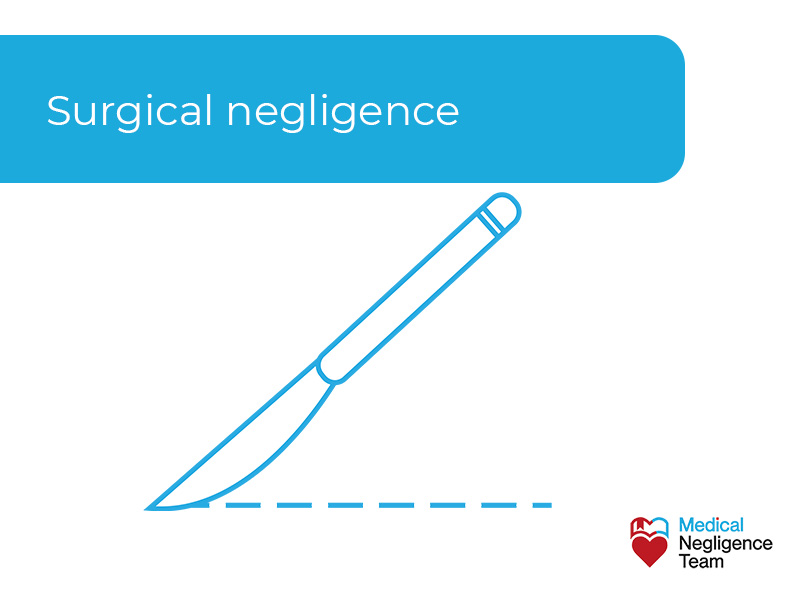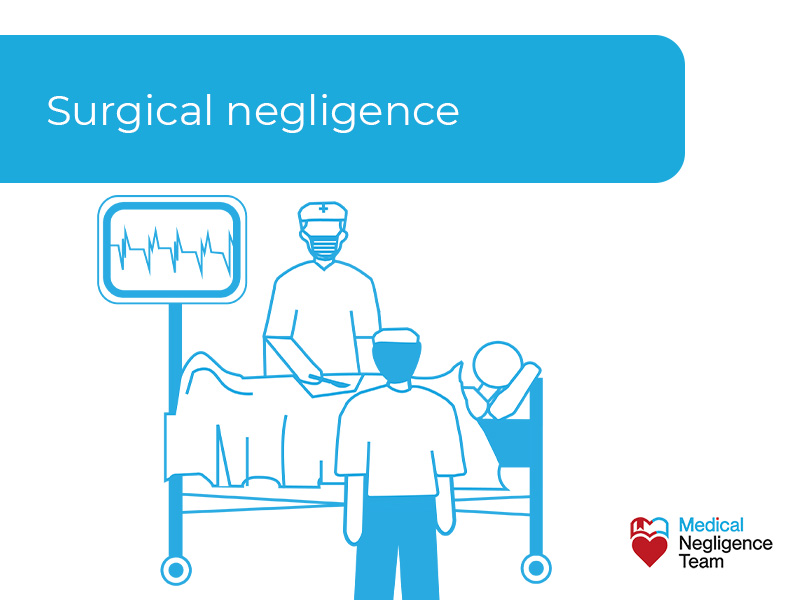Retained objects in the body during surgery, such as swabs, is medical negligence. The retained object will cause infection, do internal damage and put the patient’s life in danger.
You rely on the surgeon and their team to work at the highest professional standards. To leave something inside you after surgery is unacceptable and far from the joke of comedy movies and shows.
Surgical instruments, lost gloves, clamps and other small objects are retained in the body after surgery. Retained items are only missed when they do damage, such as perforating the bowel or causing an infection.
You can file a compensation claim if you or a loved one has suffered from retained objects during surgery negligence.
A No Win No Fee medical negligence solicitor handles retained objects during surgery claims and gets you the compensation you deserve.

Table of content
What are retained objects during surgery claims?
Retained objects during surgery claims are when you bring a claim for compensation against the surgeon responsible for the error. You are the one who is suffering because of their low standards of surgery, and they should pay you compensation for it.
The retained objects during surgery negligence has a long list of examples of surgical errors. It happens more than you may believe and can be devastating when it happens to you.
Medical negligence claims cover all aspects of errors by medical professionals. Surgical negligence, such as retained objects, is life-threatening at a time your health is already at risk.
A No Win No Fee medical negligence solicitor will find out how the retained object surgical negligence happened to you as part of your compensation claim.
How do retained objects during surgery happen?
Retained objects during surgery happen due to surgical negligence by the operating team. Leaving something like a precision tool inside you should never happen, but these events occur more than you might imagine.
A retained object during surgery is known as a never event. The NHS terms a never event as a type of medical negligence that should not happen, but never events do happen, a lot.
The NHS sees a never event as a serious yet preventable incident. If everyone follows the strict protocol, a never event cannot happen.
Medical negligence is when a never event happens due to staff not following the explicit guidelines surrounding every area of medical procedures.
A major never event in surgical circles is retained objects during surgery. If procedures are followed, foreign objects should be outside your body, but history shows items are retained during surgery.

What items can be retained in the body during surgery?
Items retained during surgery can be the likes of gloves, swabs and surgical instruments. Every item retained during surgery can harm the body, and the bigger the item, the bigger the harm.
Some common items retained in the body during surgery are:

Each item retained in the body during surgery has a use. The item is no longer of any use when surgery is over and should be accounted for by the operating theatre staff.
To leave an item in the body during surgery should not happen. It is an avoidable never event if staff follow the strict protocols.
When an item is retained in the body during surgery, you can file a compensation claim for the effects of the surgical negligence.
What are the effects of having retained objects in your body from surgery?
The effects of having retained objects in your body from surgery are severe illness, and most are life-threatening. Often the effects of the surgical negligence do not come to light until later when the damage is done.
Some of the effects of having retained objects in your body are:
The effects are serious and will have a detrimental impact on your health. The longer the retained object stays in your body, the more damage it will do.

Infection from a retained object
Infection from a retained object happens when bacteria from a swab or needle gets into your system. An infection can spread quickly and do a lot of damage to the parts of your body affected by the retained object.
Raised temperature and nausea are signs of infection which can quickly become Sepsis.
Sepsis from a retained object
Sepsis from a retained object is when an infection remains untreated. In medical terms, Sepsis is your body’s extreme reaction to an infection. Your body goes into shutdown, and if left untreated, Sepsis will lead to death.
Retained surgical objects lead to untreated infections that cause Sepsis.
Perforated organs from a retained object
Perforated organs from a retained object result from sharp items being left in the body after surgery. Organs such as the bowel or stomach are easily perforated by needles or scalpels left behind by a surgeon.
A sharp object left in the body will do untold damage and quickly put the patient’s life in danger.
Chronic pain from a retained object
Chronic pain from a retained object in the body after surgery can go on for months and even years. A small suction cup or screw left inside your body can niggle away at surrounding organs or muscles.
The pain will become chronic, and the retained object will cause discomfort for years if left in your body.
Swelling around the area
Swelling around the area of the retained object is often the first sign of trouble after surgery. The swelling may result from infection, or it could be due to the size of the retained object, such as a swab or clamp.
An X-Ray or MRI scan should show the retained object, and further surgery is the only solution.
Retained objects in the body during surgery cause problems such as infection and pain. The effects can be life-threatening.
It happens a lot, and you can file a compensation claim for medical negligence against the surgeon or hospital responsible.
How often are surgical items left in a body after surgery?
Surgical items are left in the body after surgery almost 100 times a year. One time is too much, but 100 times is almost unbelievable for a never event to happen.
Nearly 100 times that infection, swelling, chronic pain or Sepsis is allowed to happen due to a retained item during surgery. If the surgical team are doing a professional job, then medical negligence would happen.
Unfortunately, the medical negligence of leaving a surgical item inside the body happens nearly once every three days—a lot of suffering for patients and families.
The leading figures on surgical items left in the body are:
All surgical items left in the body do damage. When you suffer from surgical negligence, you can file a compensation claim for damages against those responsible.
Who is responsible for retained items during surgery?
A medical professional is responsible for retained items during surgery. The operating room’s surgeon and medical staff must ensure nothing is left inside you.
After surgery, a checklist must be followed for all items used during surgery. Surgical instruments should be checked both before and after surgery to make sure they are intact. Swabs should be counted, and none should be left inside your body.
Medical negligence happens when the surgeon or staff do not do their job properly. Any retained items during surgery result from medical negligence, and someone is responsible for it happening to you.
Retained items during surgery cause infection, pain and even death in some cases. A No Win No Fee medical negligence solicitor can make your claim for compensation for a retained item during surgery.

How much can I claim for a retained item during surgery?
You can claim compensation amounts more than £5,000 for a retained item during surgery compensation case. The amount you claim depends on the damage caused to you, and there is not one fixed award in medical negligence claims.
The amount of compensation differs from patient to patient, depending on the circumstances and effects of the retained items during surgery.
When making a claim for retained objects during surgery, you are looking for compensation for what happened at the hands of a medical professional. The negligent treatment caused you temporary or permanent injury, and you deserve compensation for the suffering.
As in all medical negligence claims, each case is dealt with on its merits and how much you have suffered from the retained objects during surgery.
A No Win No Fee medical negligence solicitor will be the only one who can advise you on a retained objects during surgery claim. They will know from experience what your case may be worth and how to go about a successful claim.
Your No Win No Fee medical negligence solicitor will handle your retained objects during surgery claim and get you compensation for all damages incurred.
What can you claim for when you sue for retained objects during surgery?
You can claim compensation for any damages that occurred when you sue for retained objects during surgery.
There are two types of compensation damages due when suing for any type of medical negligence: General damages and Special damages.
General damages
General damages are when you sue for the pain, suffering and the loss of amenity, PSLA, you have experienced due to negligence.
Special damages
Special damages include loss of earnings, future care costs, and out-of-pocket expenses.

Be sure to keep payslips, receipts and proof of any losses you experience as a result of the medical negligence.
You deserve compensation to cover all losses, including loss of life, medical costs and any long-term care needs.
You make a compensation claim when you or a loved one suffers from the effects of retained objects during surgery.
Your No Win No Fee solicitor will guide you through the steps in making a retained objects during surgery claim.
What are the steps involved in making a retained objects during surgery claim?
The steps involved in making a retained objects during surgery claim go from seeking medical advice to issuing court proceedings.
The steps are a part of any successful compensation case, and settlement can happen at any stage in the process.
Your medical negligence solicitor will do the rest when you follow the steps correctly and get all the facts and figures together.
Step 1: Seek medical advice
Seek medical advice on the injuries you have suffered or are suffering with immediately you realise you experienced from a retained object during surgery.
Step 2: Contact a specialist medical negligence solicitor
Contact a specialist medical negligence solicitor who operates on a No Win No Fee basis and tell them what went wrong. The right solicitor will look at your case, see where the problem lies, and advise if you have a retained objects during surgery claim.
The Medical Negligence Team also have a 100% Compensation Guarantee scheme, where you get all the money awarded in a negligence claim.
You are the one who suffered medical negligence, and you should get all the money due for the suffering.
Step 3: Your medical negligence solicitor obtains your medical records
Your medical negligence solicitor obtains your medical records with your permission. By reading your records, they will confirm if they think you have a valid retained objects during surgery claim.
The medical negligence team will know from your medical records if the case will result in compensation being paid.
Step 4: The medical negligence solicitor sending a letter of claim to the negligent party
The medical negligence solicitor sending a letter of claim to the negligent party is the next step. The letter will ask them to admit the retained objects during surgery negligence in what is known as ‘sending a letter of claim.’
When the negligent party receives the letter of claim, it has up to four months to provide a written response.
Step 5: Getting a response from the negligent party’s insurer
Getting a response from the negligent party’s insurer will move your compensation claim closer to a conclusion.
The insurer will either admit the medical negligence or say they intend to defend the case. Deciding to defend the case is known as ‘deny liability’ in legal terms.
If they admit liability, your retained objects during surgery claim can be valued, and the two parties will meet to decide on your compensation payment.
Your solicitor will negotiate with the negligent party and use their experience to get the compensation you deserve.
Step 6: Issuing court proceedings
Issuing court proceedings is the next step if they deny liability in your retained objects during surgery claim.
Going to court happens, too, when they are not prepared to pay a fair amount for the injuries you have suffered. Your medical negligence solicitor issues the court proceedings.
Remember that less than 1% of medical negligence cases end up in court, and very few of those cases ever make it to the courtroom.
Using a No Win No Fee solicitor
Using a No Win No Fee solicitor is the only way to a successful retained objects during surgery compensation claim. Your No Win No Fee medical negligence solicitor will not charge you for a claim you do not win.
Always have a fee agreement in place before engaging a medical negligence solicitor. If they start talking of a ‘win fee’ or a ‘success fee,’ you should walk away. The negligent party insurers should pay all fees.
The medical negligence solicitor should also operate a 100% Compensation Guarantee scheme. When you win the case, all the money awarded should go to you, not the solicitor.
You are the one who suffered retained objects during surgery, and you deserve the compensation to get your life back to normal.
How long do I have to make a claim for retained objects during surgery?
You have three years to make a claim for retained objects during surgery. All medical negligence claims are subject to limitation periods.
For example, in England and Wales, medical negligence claims must generally be brought and court proceedings issued, within three years of the injury, or three years of knowledge of the facts giving rise to the claim.
If someone has passed away, it is the date of death if the limitation period has not expired at the date of death.
Children not under a disability typically have until they reach 21 to start a retained objects during surgery claim or court proceedings.
Persons under a disability, who lack capacity, are not subject to any limitation period.
Can I make a medical negligence claim against the NHS?
Yes, you can make a medical negligence claim against the NHS. Suing the NHS for negligence is not unusual. People sue the NHS for compensation for medical negligence and receive the money they deserve for the negligent treatment.
Each year there are between 8,000 and 10,000 successful medical negligence claims against the NHS. Amounts in compensation claims awarded against the NHS range from £1000 to over £10 million.
The amount of compensation you receive covers minor injuries such as scarring to serious life-threatening negligence, which leaves you with long-term care needs.
We trust in and use the NHS daily and do not expect negligence. It happens, though, and the NHS has a dedicated team to handle medical negligence compensation claims, called NHS resolution.
NHS Resolution has a responsibility to treat patients who seek compensation fairly. Patients pay for the NHS through their taxes, and for that they deserve respect and the best medical treatment.
Contact The Medical Negligence Team
Contact the Medical Negligence Team today to discuss your retained objects during surgery claim for compensation. We have both the legal and medical experts to guide you along the steps to a successful medical negligence claim for compensation.
At the Medical Negligence Team, we fight every compensation claim on a No Win No Fee basis. You will not be out of pocket for an unsuccessful claim.
We have a very high success rate and a reputation for a speedy and successful resolution to all medical negligence cases.
Our 100% Compensation Guarantee puts all the money you win into your pocket. You or your loved one suffered from retained objects during surgery, and you deserve every penny of the compensation claim.
Contact us at the Medical Negligence Team for all your medical negligence needs.


